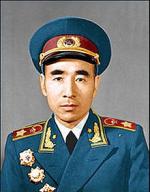Disable ads!
Lin Biao
Lin Biao Chinese 林彪 Transcriptions Mandarin Hanyu Pinyin Lín Biāo Wade–Giles Lin2 Piao1 Lin Yurong Chinese 林育蓉 Transcriptions Mandarin Hanyu Pinyin Lín Yùróng Wade–Giles Lin2 Yü4-jung2 Lin Biao (pinyin: Lín Biāo; Wade–Giles: Lin Piao; IPA: [li n pjɑ ʊ]; December 5, 1907 – September 13, 1971) was a major Chinese Communist military leader who was pivotal in the communist victory in the Chinese Civil War, especially in Northeastern China. Lin was the general who commanded the decisive Liaoshen and Pingjin Campaigns, co-led the Manchurian Field Army of the People's Liberation Army into Beijing, and crossed the Yangtze River in 1949. He ranked third among the Ten Marshals. Zhu De and Peng Dehuai were considered senior to Lin, and Lin ranked directly ahead of He Long and Liu Bocheng. Lin abstained from taking an active role in politics after the civil war, but became instrumental in creating the foundations for Mao Zedong's cult of personality in the early 1960s. Lin was rewarded for his service to Mao by being named Mao's designated successor during the Cultural Revolution, from 1966 until his death. Lin died on 13 September 1971 when a plane he was aboard crashed in Mongolia. It is not known for sure why Lin boarded the doomed plane; the Chinese government's official explanation is that Lin and his family attempted to flee to the Soviet Union following a botched coup against Mao. However, others have argued that they fled out of fear they would be purged, as Lin's relationship with other Communist Party leaders had soured in the final few years of his life. Because little inside information is available to the public on what has been dubbed as the "Lin Biao incident", the exact events preceding Lin's death have been a source of speculation ever since. Following Lin's death, he was officially condemned as a traitor by the Communist Party of China. He and Jiang Qing are still considered to be the two "major Counter-revolutionary cliques" blamed by the Communist Party for the excesses of the Cultural Revolution.
 Read more on wikipedia.org Read more on wikipedia.org
 All quotes by Lin Biao All quotes by Lin Biao
 Edit Edit
|

|
|
|
|
|
Background photo by Giuliana
|